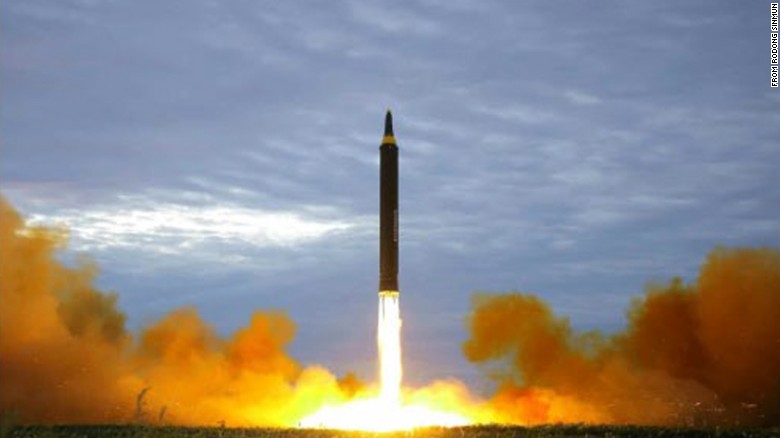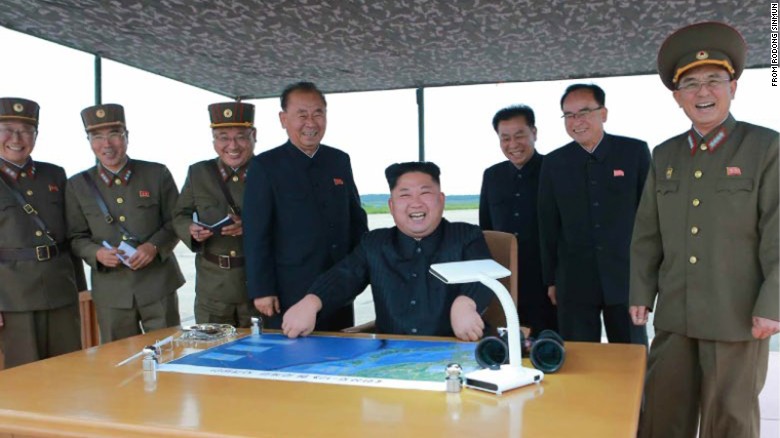North Korea's launch of a missile over Japan was a prelude to more military operations directed at the American territory of Guam, North Korean state media warned Wednesday.
The country's state-run Korean Central News Agencyreported leader Kim Jong Un presided over the dawn launch Tuesday of the "ultra-modern rocket system," the first missile ever fired from the capital Pyongyang.
North Korean officials told CNN in Pyongyang that Kim was "very satisfied with the performance of the missile."
The intermediate-range missile, identified by the North Koreans as the Hwasong-12, flew over Japan, further fueling tensions between North Korea and the United States and its allies, Japan and South Korea.
The launch was "the first step of the military operation of the (North Korean military) in the Pacific and a meaningful prelude to containing Guam," state media said.
Guam governor's office said in a statement there is no change in the island's threat level.
"We knew, based on North Korea events in previous years, that with the joint exercise between the US, South Korea, and its Allies, we can expect rhetoric and activity in North Korea," said George Charfauros, Guam homeland security adviser.
South Korean President Moon Jae-in and Japanese Prime Minister Shinzo Abe both now believe "pressure on North Korea should be raised to its limit so that North Korea will voluntarily come to the table for dialogue," South Korean presidential spokesman Park Su-hyun said in a statement Wednesday.
The two also agreed that the United Nations Security Council should enact more detailed and effective sanctions against North Korea. A new round of sanctions against Pyongyang were unanimously approved by the Security Council earlier this month.
Guam back in the crosshairs
Guam has long been a focal point of North Korea's anger against the US and is often a target of North Korean saber-rattling.
It was threatened specifically by North Korea in 2013 and again earlier this month, following a fiery exchange of threats and insults between Trump and the North Korean regime.
The small island in the Western Pacific is the closest US territory to North Korea and hosts two important US military installations.
One is Andersen Air Force Base, from which the US has been staging B-1 bomber flights over the Korean Peninsula, often in response to North Korea's missile tests.
The US flew bombers over North Korea following Pyongyang's two successful tests of intercontinental ballistic missiles in July.
'All options on the table'
Tuesday's missile was fired just before 6 a.m. Japan time (Monday 5 p.m. ET). The launch set off emergency sirens in northern Japan, triggering text messages that warned residents to seek cover.
"The launch occurred in the vicinity of Sunan Air Base, North Korea and flew east ... The ballistic missile overflew the territory of northern Japan before landing in the Pacific Ocean approximately 500 nautical miles east of Japan," a statement from the Pentagon said.
It was the fourth missile North Korea fired in four days -- Pyongyang tested three short-range ballistic missiles, one of which failed, from Kangwon province that landed in water off the Korean Peninsula.
Kim Jong Un's regime regularly fires missiles into the sea between its own territory and Japan, however this is the first North Korean ballistic missile to ever fly over the country.
Though there is a political aspect to these launches, as much the international community sees them as a provocation North Korea conducts them in order to perfect its missile technology.
Trump reacts
The launch drew a strong rebuke from US President Donald Trump who again warned that "all options are on the table."
"The world has received North Korea's latest message loud and clear: this regime has signaled its contempt for its neighbors, for all members of the United Nations, and for minimum standards of acceptable international behavior," he said Tuesday.
"Threatening and destabilizing actions only increase the North Korean regime's isolation in the region and among all nations of the world. All options are on the table."
The global community also swiftly condemned the launch as a violation of international law.
The United Nations Security Council demanded North Korea stop further missile launches, strongly condemning the country's "outrageous actions."
North Korea is "deliberately undermining regional peace and stability," causing grave concerns around the world, Egyptian Ambassador and current Security Council President Abdellatif Aboulatta said in a prepared statement, agreed to by all 15 Council members.
Japanese Prime Minister Abe called the launch "the most serious and grave threat ever" against the country.
South Korea responded by conducting a bombing drill at 9:30 a.m. local time to test its "capability to destroy the North Korean leadership" in cases of emergency, an official with the country's Defense Ministry told CNN.
Retaliation for drills
North Korea state media gave more details about the motivation for the launch Wednesday, noting that it came on the 107th anniversary of the annexation of Korea by Japan in 1907.
It said it sent a strong message amid ongoing joint US-South Korean military drills in the southern half of the Korean Peninsula.
Washington and Seoul say are defensive in nature but Pyongyang believes are preparation for an eventual invasion.
Kim praised the crew's "smart and accurate movement" and said the drill "would offer them an opportunity for gaining a good experience in their rocket operation for an actual war," according to KCNA.


Comments
Post a Comment